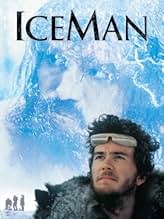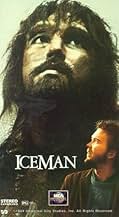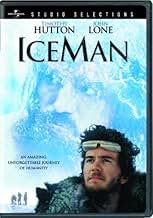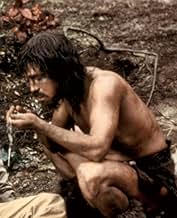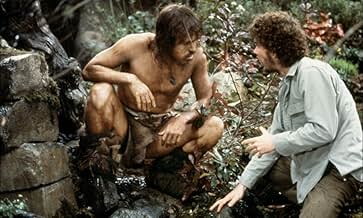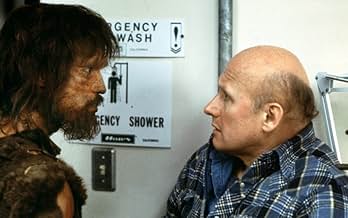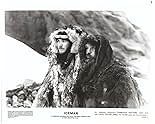Iceman
- 1984
- Tous publics
- 1h 40min
NOTE IMDb
6,2/10
6,4 k
MA NOTE
Un homme de Néandertal préhistorique trouvé gelé dans la glace est réanimé par une équipe d'exploration de l'Arctique, qui tente alors de l'utiliser pour ses propres moyens scientifiques.Un homme de Néandertal préhistorique trouvé gelé dans la glace est réanimé par une équipe d'exploration de l'Arctique, qui tente alors de l'utiliser pour ses propres moyens scientifiques.Un homme de Néandertal préhistorique trouvé gelé dans la glace est réanimé par une équipe d'exploration de l'Arctique, qui tente alors de l'utiliser pour ses propres moyens scientifiques.
- Réalisation
- Scénario
- Casting principal
Judith Berlin
- E.K.G. Doc
- (as Judy Berlin)
Réal Andrews
- Lab Tech
- (as Real Andrews)
Avis à la une
Unusually intelligent sci-fi, about a group of polar researchers who discover a hibernating (and slightly too human-looking) Neanderthal. The scientists (predictably) just want to cut him up, but Tim Hutton plays the lone anthropologist who befriends him and teaches him how to sing along to Neil Young. At times the film (pre-CGI) seems dated in appearance, but its strength is not to underestimate the difference between the Neanderthal's world and our own, nor his capacity to deal with it. Good to see a sci-fi film that for once is more interested in substance than surface.
What you think of "Iceman" depends on your general nature. If you are sentimental and deeply moved by stories of great emotion, you'll love it. If you are hard-edged, cynical and opposed to the least bit of softening in life, you'll think it crass. I know what side of the fence I'm on. I loved the movie and was moved to tears the first time I saw it. It still moves me all these years later.
In the high arctic, the remains of a Neanderthal hunter are found perfectly preserved in ice. To the astonishment of the scientists who handle the remains, the capacity for life still lingers in the body. They return the frozen primitive to life in the 20th century...at least 20,000 years after his "death". The revival of "Charlie" sparks a multitude of moral dilemmas for the scientists. Earnest young anthropologist Shepherd wants to know Charlie as a man and bonds with the primitive. Other scientists want to use the special properties of Charlie's blood to preserve human life...a good goal, but they look at him as a specimen.
When Charlie escapes from the special environment prepared for him, havoc ensues, leading to a powerful ending where he tries to complete the quest he started tens of thousands of years ago.
The tale is simple and heartfelt. John Lone gives an astonishing performance as Charlie. His physical movements and primitive vocalizations completely bring to life a man from the dawn of time. Yet we also sense moments of sadness, anger, humor and family pride from him. Thanks to the Academy's snubbing of fantasy/SF films, which would not be erased until the massive success of the "Lord of the Rings" trilogy years later, Lone's Oscar-worthy performance was ignored. You will be amazed by the humanity he brings to the role. Timothy Hutton is earnest and sincere as the moral but naive scientist who tries his best to help his Neanderthal friend.
The movie is not perfect...some of the scientific jargon is overdone and I was incredibly annoyed by James Tolkan's constant gum-chewing...but it succeeds in matters of the heart. The ending is sad yet triumphant. If you think about the situation, it was the best possible ending for Charlie given the circumstances.
Anyone with a heart and a sense of wonder should enjoy "Iceman".
In the high arctic, the remains of a Neanderthal hunter are found perfectly preserved in ice. To the astonishment of the scientists who handle the remains, the capacity for life still lingers in the body. They return the frozen primitive to life in the 20th century...at least 20,000 years after his "death". The revival of "Charlie" sparks a multitude of moral dilemmas for the scientists. Earnest young anthropologist Shepherd wants to know Charlie as a man and bonds with the primitive. Other scientists want to use the special properties of Charlie's blood to preserve human life...a good goal, but they look at him as a specimen.
When Charlie escapes from the special environment prepared for him, havoc ensues, leading to a powerful ending where he tries to complete the quest he started tens of thousands of years ago.
The tale is simple and heartfelt. John Lone gives an astonishing performance as Charlie. His physical movements and primitive vocalizations completely bring to life a man from the dawn of time. Yet we also sense moments of sadness, anger, humor and family pride from him. Thanks to the Academy's snubbing of fantasy/SF films, which would not be erased until the massive success of the "Lord of the Rings" trilogy years later, Lone's Oscar-worthy performance was ignored. You will be amazed by the humanity he brings to the role. Timothy Hutton is earnest and sincere as the moral but naive scientist who tries his best to help his Neanderthal friend.
The movie is not perfect...some of the scientific jargon is overdone and I was incredibly annoyed by James Tolkan's constant gum-chewing...but it succeeds in matters of the heart. The ending is sad yet triumphant. If you think about the situation, it was the best possible ending for Charlie given the circumstances.
Anyone with a heart and a sense of wonder should enjoy "Iceman".
If you can set aside the scientific implausibilities (or impossibilities) that abound in this movie, you can appreciate it from a number of angles. I first saw it many years ago and just watched it again - and still found it touching and relevant. Timothy Hutton starred as Sheppard - part of a scientific team in the Arctic who discover something frozen in the Arctic ice, and eventually discover that it's a Neanderthal who was somehow trapped there perhaps 40000 years ago. Intending to thaw him out and cut him up and ship various parts of his body around the world for study, the team is shocked when the Iceman comes to life. Played superbly by John Lone, the Iceman is alone, afraid and bewildered by the strange surroundings in which he finds himself, and the team basically continues to see him as a science project for lack of a better way to describe it - a specimen to be studied. But Sheppard sees him as a man and tries to understand him, communicate with him and befriend him. The interaction between the two came across as authentic, and the bond between them was believable. The viewer bonds with the Iceman too - or, if you don't, there's something wrong with you. The viewer starts to see him as a person; starts to sympathize with his plight. This is definitely a movie that pulls you in successfully.
It's also a movie that - while dated in many ways - does have a strange relevance to today's world. We're not likely to ever find a frozen Neanderthal and bring him back to life. Even Otzi the Iceman (who was frozen in ice only 5000 years ago is most definitely dead and not coming back.) But there are scientists who think they can bring back extinct species like mammoths, and some speculation that eventually someone might try to bring back a Neanderthal (notwithstanding that most of us aside from Africans already have Neanderthal DNA in our bodies.) Watching this movie and thinking about that possibility - I started to wonder. Should we? Even if we could? What sort of life would we give to the poor creature? Would we treat it as a human, or would we treat it as a lab rat, subjecting it to never ending experiments and tests and studies? Would we be Sheppard - or would we be everybody else? I suspect I know the answer to that.
Maybe it's best to leave the Neanderthals where they are - buried deep in our own DNA. (7/10)
It's also a movie that - while dated in many ways - does have a strange relevance to today's world. We're not likely to ever find a frozen Neanderthal and bring him back to life. Even Otzi the Iceman (who was frozen in ice only 5000 years ago is most definitely dead and not coming back.) But there are scientists who think they can bring back extinct species like mammoths, and some speculation that eventually someone might try to bring back a Neanderthal (notwithstanding that most of us aside from Africans already have Neanderthal DNA in our bodies.) Watching this movie and thinking about that possibility - I started to wonder. Should we? Even if we could? What sort of life would we give to the poor creature? Would we treat it as a human, or would we treat it as a lab rat, subjecting it to never ending experiments and tests and studies? Would we be Sheppard - or would we be everybody else? I suspect I know the answer to that.
Maybe it's best to leave the Neanderthals where they are - buried deep in our own DNA. (7/10)
I saw this again after many years, and was not disappointed. It's a well written, thoughtful SF film that doesn't insult the viewer's intelligence. John Lone is very moving as the bewildered hunter who is discovered by scientists. Timothy Hutton is credible as Shepherd, the compassionate scientist who connects with the Neanderthal, who he calls "Charlie". The film's portrayal of Charlie as a human being with a deeply spiritual side is strangely prescient, especially in light of recent discoveries about our own Neanderthal DNA. The scene where Shepherd and Charlie try to sing Neil Young's "Heart of Gold" is memorable and fun. This is a quietly effective film with a subtle message that doesn't beat you over the head with it.
It's sad to read some of the "summaries" and comments here about "Iceman." Some people dismiss 1980s movies outright, and think the usually overblown, CGI dominated "science fiction" movies of the 21st century are better!?! That makes me laugh. "Iceman" is a fine, understated, thought-provoking (ooh, that might injure some viewers) movie of the first order, no matter the genre.
I like the previous comment about John Lone being unjustifiably denied an Oscar nomination for that year (1983) -- he should have not only been nominated as best supporting actor, he should have won. And I thought so at the time. (The winner was Jack Nicholson for his supporting role in "Terms of Endearment," a pleasant if lightweight performance for him.) The original screenplay; the excellent, evocative soundtrack by Bruce Smeaton, and perhaps even director Fred Schepisi should also have been nominated, though I can understand the votes for the winners in those categories.
Those who think this character is a "Neanderthal" have a problem with anthropological/archaeological logic. He is a migrating human ancestor from 40,000 years ago, primitive but quick to learn and ingenious -- yet very different from those who would be his modern descendants (though with traditional links), let alone those of us whose ancestors MUCH later migrated to North America. He led a very hard life before he was frozen and has a much different belief system.
As for the ending: Those who don't get it seem to lack a true sense of wonder and mystery ... or are more than a little dense.
I like the previous comment about John Lone being unjustifiably denied an Oscar nomination for that year (1983) -- he should have not only been nominated as best supporting actor, he should have won. And I thought so at the time. (The winner was Jack Nicholson for his supporting role in "Terms of Endearment," a pleasant if lightweight performance for him.) The original screenplay; the excellent, evocative soundtrack by Bruce Smeaton, and perhaps even director Fred Schepisi should also have been nominated, though I can understand the votes for the winners in those categories.
Those who think this character is a "Neanderthal" have a problem with anthropological/archaeological logic. He is a migrating human ancestor from 40,000 years ago, primitive but quick to learn and ingenious -- yet very different from those who would be his modern descendants (though with traditional links), let alone those of us whose ancestors MUCH later migrated to North America. He led a very hard life before he was frozen and has a much different belief system.
As for the ending: Those who don't get it seem to lack a true sense of wonder and mystery ... or are more than a little dense.
Le saviez-vous
- AnecdotesThe age of the iceman in the film was forty thousand years. Seven years after this film was released, a real "iceman" was discovered in the Ötztal Alps in 1991. Named 'Ötzi the Iceman', the real-life iceman had pollen found in his stomach just like the iceman in this film.
- GaffesWhen Charlie is looking upwards to the helicopter, his open mouth reveals a large number of silver fillings. Such dentistry, obviously, wouldn't have been available during the stone age.
- Citations
[first lines]
Title Card: I, who was born to die, shall live. That the world of animals, and the world of men, may come together, I shall live. - Inuit Legend
- Crédits fous(opening quote) I, who was born to die Shall live. That the world of animals And the world of men May come together, I shall live. -- Inuit Legend
- ConnexionsFeatured in At the Movies: Where the Boys Are/Iceman/Champions/Kirov (1984)
Meilleurs choix
Connectez-vous pour évaluer et suivre la liste de favoris afin de recevoir des recommandations personnalisées
- How long is Iceman?Alimenté par Alexa
Détails
Box-office
- Budget
- 10 000 000 $US (estimé)
- Montant brut aux États-Unis et au Canada
- 7 343 032 $US
- Week-end de sortie aux États-Unis et au Canada
- 1 836 120 $US
- 15 avr. 1984
- Montant brut mondial
- 7 343 032 $US
- Durée
- 1h 40min(100 min)
- Couleur
- Mixage
- Rapport de forme
- 2.35 : 1
Contribuer à cette page
Suggérer une modification ou ajouter du contenu manquant


